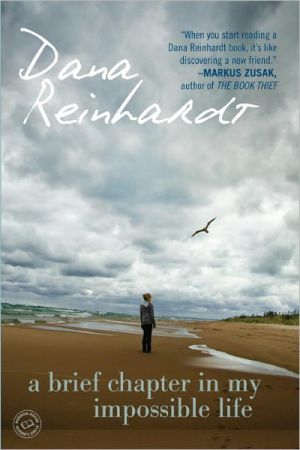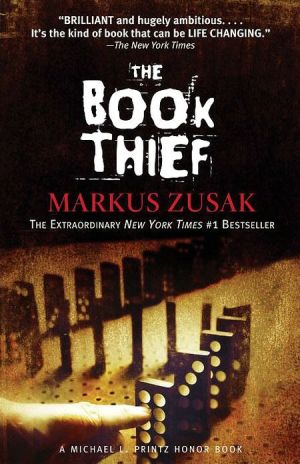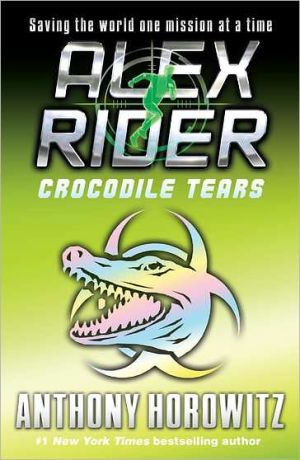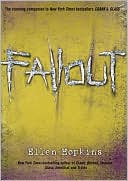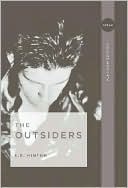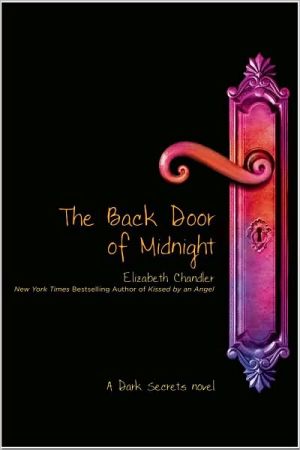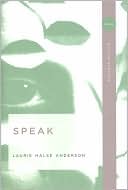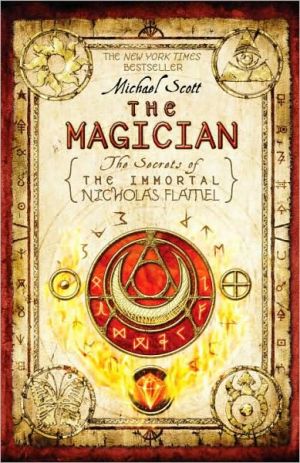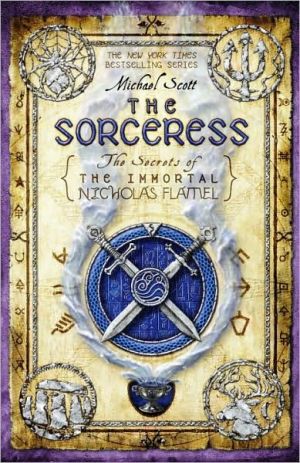A Brief Chapter in My Impossible Life
You can tell what really makes Simone different just by looking at her: she doesn't resemble anyone in her family. She's adopted. She's always known it, but she's never wanted to know anything about where she came from. She's happy with her family just as it is, thank you.\ Then one day, Rivka calls, and Simone learns who her mother was—a 16-year-old, just like Simone. Who is Rivka? What does she want? Why is she calling now, after all these years? The answers lead Simone to deeper feelings...
Search in google:
Simone s starting her junior year in high school. Her mom s a lawyer for the ACLU, her dad s a political cartoonist, so she s grown up standing outside the organic food coop asking people to sign petitions for worthy causes. She s got a terrific younger brother and amazing friends. And she s got a secret crush on a really smart and funny guy who spends all of his time with another girl. Then her birth mother contacts her. Simone s always known she was adopted, but she never wanted to know anything about it. She s happy with her family just as it is, thank you. She learns who her birth mother was a 16-year-old girl named Rivka. Who is Rivka? Why has she contacted Simone? Why now? The answers lead Simone to deeper feelings of anguish and love than she has ever known, and to question everything she once took for granted about faith, life, the afterlife, and what it means to be a daughter.Publishers WeeklyIn a moving first novel, Reinhardt uses a sure but gentle hand to explore the relationship that develops between an adopted teen and her biological mother. Simone Turner-Bloom, 16, has always known she was adopted but has avoided asking questions about her past. She thinks of Rivka, the woman who gave her up at birth, in abstract terms: "Rivka became just a word to me, one with geometric shape, all angles and points. Somehow I've managed to keep myself from attaching it to a face." Thus it comes as a shock when Rivka calls to suggest that the two of them meet. Reluctantly agreeing, Simone is unprepared for the profound impact the reunion has on her life. During the next several weeks as she becomes acquainted with her biological mother, Simone learns of her Orthodox Jewish roots and is introduced to a new culture. As Rivka's tragic history gradually unfolds, Simone finds herself questioning things that have previously seemed irrelevant: the circumstances of her adoption, the possible existence of God and the meaning of family. At the same time, she enters her first serious relationship with a boy, who acts as both guide and confidante during Simone's "chapter" of self-discovery. Besides offering insight into the customs of Hasidic Jews, this intimate story celebrates family love and promotes tolerance of diverse beliefs. Readers will quickly become absorbed in Simone's quest to understand her heritage and herself. Ages 12-up. (Feb.) Copyright 2006 Reed Business Information.
A Brief Chapter in My Impossible Life\ \ By Dana Reinhardt \ Random House\ Dana Reinhardt\ All right reserved. \ ISBN: 0385746989 \ \ \ Chapter One\ Look at us. A family of four. Seated around the dinner table. Someone asks: "Pass the couscous." The son. The younger of the two children, he has a mop of sandy blond hair the girls in his class find excuses to touch. The older sister pretends to spit in the couscous before she slides it over to him. He rolls his eyes. The parents don't notice. They're unusually quiet tonight. Mom is at one end of the table, Dad at the other. Here we are. We do this every night. We eat our dinner together. Isn't it perfect? Aren't we the perfect family?\ Now look more closely. The mother also has that sandy blond hair, although hers is tied back in a loose ponytail, and let's face it: she probably could be more attentive to those split ends. The father doesn't have much hair to speak of and what he does have is darker, but the pictures in the hallway reveal that he was once a fair-haired boy with a suspicious glare for the camera.\ Now look at the older sister. The differences don't stop at the hair. I have olive skin and almond eyes. I don't have the father's dimpled chin. I don't have the mother's husky voice. I'm a whiz in math. I can fold my tongue into the shape of a U. Did you know that the ability to do that is hereditary? No one else in my family can do that.\ This is where we are all sitting, at the dining room table, eating Dad's Moroccan chicken with couscous, when my mother puts down her fork, fixes me with one of her looks, and says, "Rivka called. She wants to meet you."\ \ Let's back up. Let me tell you about my day. When I was really little my parents used to start every morning by saying, "Let me tell you about your day." They'd go through every detail: "And then you are going to read some books, then you are going to have a nap, then Daddy's going to take you to the park to play with Cleo, then we're going to eat dinner . . ." Not exactly riveting information, but they said I had a problem with control and that I needed to feel like not every decision was being made for me. By the way, you'll notice that every decision was indeed being made for me, and telling me about these decisions wasn't giving me any real control over them, only the illusion that I had control over them. Which is kind of sneaky. Anyway. Let me tell you about my day and what preceded the Moroccan chicken and couscous and my parents dropping the bomb of Rivka on me.\ \ School started last week. So you can probably imagine what it's like. There's a feeling like the year can go any way you want it to: teachers don't know you yet, your clothes are new, your hair is freshly cut and styled, and also Cleo's boobs got really big over the summer. I had suspected this all summer long and mentioned it to her on more than one occasion, but you know how it is hard to notice changes when they're happening right in front of you. So when we got back to school and a few of our other friends said something to her, she started to realize that maybe it really was true and maybe she should actually go to one of those old, heavily perfumed ladies in the women's intimates department at Filene's and get herself measured for a new bra because, as I mentioned, I'm pretty good at math, which includes geometry, and I can tell you with confidence that she is no longer a 32B. And then today Conor Spence, who's a total jerko jock but is also kind of hot if you like guys like that, which neither of us does, stopped and said, "Nice tits, Warner" to Cleo as we walked by him in the hallway, and she was totally mortified but also, I imagine, a little bit thrilled.\ So after Cleo's boobs literally stopped traffic, we went to English, which is the only class we have together this semester. We've been friends since our diaper days. Her mom, Jules, and my dad met at the playground pushing us in those little bucket swings. They were both home with babies, bored out of their minds. They started to get together a couple of times a week and throw us on a blanket on the floor with some bright plastic toys we weren't supposed to choke on, although once I somehow managed to anyway. This is what they called a play date. And just in case you are getting any weird ideas about Cleo's mom and my dad, nothing ever happened there. Jules became great friends with Mom too, even though Mom was always working and not around for those mind-numbing afternoons of baby care. Jules would come over with Cleo for dinner whenever Cleo's dad was working late or out of town. But they never got together as couples because Dad and Mom never liked Edward. Eventually Jules had to admit that she didn't like him either, and when Cleo was five they got divorced. He moved to Scottsdale, remarried, and has two young kids. Cleo hasn't seen him since three Christmases ago.\ In English class we're reading The Great Gatsby. I didn't read the chapters last night because . . . well, I guess I don't really have a good excuse other than laziness and my brother bursting in and out of my room to ask questions about his homework. I knew what he really wanted was to pump me for information about upper school, not about Algebra 1. Jake just made the gargantuan leap from the lower school to the upper school campus. It's an entirely new social order, and Jake is trying to figure out the food chain. All the people he's heard me talk about on the phone or with Cleo when she's over are suddenly flesh and blood to him. So he wanted to know if Stephanie Stark was that fat when she was going out with Mike Pine or whether her ballooning weight was the reason Mike dumped her for Heidi Kravitz. See? Jake needs me; that's why I couldn't get to The Great Gatsby. So in class I just sat there and drew in my notebook and listened to the discussion and actually wished I had done the reading because there were some things I would have liked to say. And mercifully, Mr. Nardo never called on me.\ After U.S. history I had a free period. For the first month of school all the student groups have tables set up in the gym where you can go and take pamphlets (and free bite-sized candy bars) and sign up for the astronomy club or the yearbook or the mime troupe or the Pig Latin association or whatever. One thing I guess you should know about me is that I hate clubs. I was never a Brownie or a Girl Scout. From ages nine to eleven I slept with a Backstreet Boys pillowcase (I'll kill you if you ever tell anyone), but I never joined the fan club.\ So my free period found me in the gym leafing through pamphlets and scarfing down bite-sized Charleston Chews looking for some clubs to join because Mr. McAdams told me that if I don't "diversify my resume" I won't get into a good college. The obvious choice for me would be to join the math club, but I don't even need to go into the reasons this will never happen, do I? I wandered around for almost forty-five minutes and was no closer to joining a club than I was when I arrived, although I did consume a staggering amount of bite-sized candy.\ It's not like I don't have interests. I like to write. I read a lot. I know almost everything there is to know about movies. I make my own T-shirts. I've always been fascinated by penguins, yet there doesn't seem to be a penguin club offering free Tootsie Pops. I guess there just isn't anything that defines me enough that I feel the need to make it official. It's like getting a tattoo. They're cool and I'd love to get one, once I come to terms with the fact that my parents would throw me out of the house, but I just can't come up with a symbol or a word or an image that says enough about who I am that I can live with it forever. But today, standing in that gym, surrounded by brightly colored Xeroxed pamphlets and miniature second-tier candy bars, I realized that there is this one thing that defines me, but there isn't a club for it and I can't tattoo it on my shoulder blade or on my ankle or on the small of my back. And I stood there through the ringing of the bell for fourth period and felt the sound ricochet inside my hollow head.\ \ It's not like I haven't spent hours or days or weeks or even years thinking about the fact that I'm adopted. My parents never tried to hide it from me. Early on I understood that my straight dark hair, olive skin, lanky build, and left-handedness-all the things that make me different from my family, good and bad-come from my own mysterious genetic pool. A pool seems too small when you think about it. It really must be more like a sea or an ocean with an endless horizon. All that past-all the events that happened or didn't happen, all the weddings, births, deaths, secrets, triumphs, fighting and then making up or maybe not making up and then moving as far away as possible to get a new start-makes us who we are. But I don't know any of these stories from my own oceanic past. I know only that all those events somehow dropped a baby at the feet of an idealistic young couple named Elsie Turner and Vince Bloom on an unseasonably snowy April day. And there I began my life as Simone Turner-Bloom.\ I've thought about this a lot, as you can see, but you might be surprised to know that I've never wanted to learn anything about my real family tree. In my mind I've cut down those branches and left a bare, solitary trunk. I know no details. Except for one. Her name: Rivka.\ \ \ \ Excerpted from A Brief Chapter in My Impossible Life by Dana Reinhardt Excerpted by permission.\ All rights reserved. No part of this excerpt may be reproduced or reprinted without permission in writing from the publisher.\ Excerpts are provided by Dial-A-Book Inc. solely for the personal use of visitors to this web site. \ \
\ Publishers WeeklyIn a moving first novel, Reinhardt uses a sure but gentle hand to explore the relationship that develops between an adopted teen and her biological mother. Simone Turner-Bloom, 16, has always known she was adopted but has avoided asking questions about her past. She thinks of Rivka, the woman who gave her up at birth, in abstract terms: "Rivka became just a word to me, one with geometric shape, all angles and points. Somehow I've managed to keep myself from attaching it to a face." Thus it comes as a shock when Rivka calls to suggest that the two of them meet. Reluctantly agreeing, Simone is unprepared for the profound impact the reunion has on her life. During the next several weeks as she becomes acquainted with her biological mother, Simone learns of her Orthodox Jewish roots and is introduced to a new culture. As Rivka's tragic history gradually unfolds, Simone finds herself questioning things that have previously seemed irrelevant: the circumstances of her adoption, the possible existence of God and the meaning of family. At the same time, she enters her first serious relationship with a boy, who acts as both guide and confidante during Simone's "chapter" of self-discovery. Besides offering insight into the customs of Hasidic Jews, this intimate story celebrates family love and promotes tolerance of diverse beliefs. Readers will quickly become absorbed in Simone's quest to understand her heritage and herself. Ages 12-up. (Feb.) Copyright 2006 Reed Business Information.\ \ \ \ \ KLIATTThis is an outstanding first novel by an enormously talented writer, described in the foreword as a "nonpracticing attorney who has worked on documentaries about many subjects, including genocide in Rwanda...." She sounds very much like the character she creates of Simone's adoptive mother, an attorney for the ACLU in the Boston area. Simone is a brilliant 16-year-old, wise and funny; she is the narrator of this story of how she comes to know her birth mother, how she grows to love her and then must lose her. All readers will be drawn to Simone's story from the first few pages, in which she describes her family, the family she knows and loves. Because this family is so dear to her, she has no interest in meeting her birth mother, even though her parents tell her that this mother, Rivka, has called and would like to meet her. They continue to press Simone as the days go by; eventually Simone telephones Rivka and the story of Simone's adoption unfolds. Rivka is from a Hasidic family and in the years since her teenage pregnancy she has been estranged from her family. She still cherishes the rituals of Shabbat, which she introduces to Simone, who has been raised in a nonreligious home. Finding out that she was born to a Jewish woman helps Simone to consider what a spiritual life might mean--one of the major themes of the story. All the secondary characters are believable and add dimension to Simone's life and narration. Her best friend Cleo and Cleo's mother have their fights, especially when the mother comes home unexpectedly to discover Cleo and her boyfriend having sex. Cleo's rather shallow, sex-filled relationship is contrasted to the slowly evolving friendship and romance between Simoneand Zack. Simone and Cleo have a circle of friends who nurture one another; some of them occasionally drink or smoke pot, one of the friends is gay, and each one is funny, creative, and loyal. Simone, her mother, her father and brother, Rivka, Zack, Cleo--each character is a fully realized human being because of Reinhardt's skill. No one is perfect here, tempers flare, stress builds, but everyone is trying hard to be a decent person. The completion Simone discovers as her love for Rivka grows helps her to face the heartbreaking ending. KLIATT Codes: SA*--Exceptional book, recommended for senior high school students, advanced students, and adults. 2006, Random House, Wendy Lamb, 228p., Ages 15 to adult. \ —Claire Rosser\ \ \ Children's LiteratureSimone is a well-adjusted teen who accepts her parents' idiosyncrasies (but why subject your friends to them?) and even loves her younger brother. Overall, life is good for her. Out of the blue her parents tell her that her birth mother would like to hear from her. She has always known she was adopted but allowing that reality into her life may not be what she wants. Her parents leave the decision to her and she ultimately decides to meet Rivka, her birth mother. Rivka brings with her a whole past that Simone never knew existed, complete with family and her Orthodox Jewish customs and beliefs. Rivka also brings a secret. This book is wonderfully written. Simone's voice is full of humor and typical teen angst as she navigates a world that has been turned upside down. 2006, Random House, and Ages 14 up. \ —Joan Kindig, Ph.D.\ \ \ \ \ VOYASimone's life changes when her parents announce, "Rivka called. She wants to meet you." Rivka is Simone's biological mother. Simone has always known that she was adopted, but she never wanted to know about her biological family. At first Simone is angry and wants nothing to do with Rivka. After sixteen years, why contact Simone now? When Simone finally agrees to meet her, Rivka tells Simone that she is sick and dying. She learns that when Rivka, a Hasidic Jew, got pregnant at sixteen, she asked Simone's adoptive mother, an ACLU lawyer, for help. Simone's parents decided to get married and adopt Rivka's baby. Simone is now torn between emotions of anguish, love, anger, and betrayal. Feelings aside, Simone realizes that she must come to terms with Rivka before it is too late. This coming-of-age novel is exceptional. Simone is an amazing protagonist who really draws the reader into her story as she goes through many emotional and spiritual changes. In the beginning she is a member of the Atheist Student Association and by the end she is performing Shabbat and Seder. Readers will gain copious knowledge about Judaism through Simone's curiosity. This novel is a perfect book discussion choice as there are many topics: adoption, Judaism, church versus state, and the definition of family. Reinhardt is a talented new author who creates a beautiful, emotionally raw and often humorous novel. It is an essential purchase for all libraries serving high school students. VOYA CODES: 5Q 4P S (Hard to imagine it being any better written; Broad general YA appeal; Senior High, defined as grades 10 to 12). 2006, Wendy Lamb Books/Random House, 228p., and PLB Ages 15 to 18. \ —Sarah Cofer\ \ \ \ \ School Library JournalGr 7 Up-Simone's junior year of high school proceeds with common teen issues such as alcohol, a first boyfriend, and sex in Dana Reinhardt's fast-paced novel (Wendy Lamb Books, 2006). Simone has a secure place in a loving family and knows it, resulting in some refreshing and self-aware musing on her part which narrator Mandy Siegfried handles beautifully. Whenever appropriate, she also musters the "whatever" tone in her voice, giving Simone an authentic teenage sound. Simone has always known she was adopted and that her birth mother is named Rivka, but never wanteed to meet her. Something is different now and her parents seem to be pressing for a meeting. Touching encounters soon reveal that her birth mother is dying from ovarian cancer. Simone becomes an angel in Rivka's life and learns how Rivka's conservative Jewish upbringing led her to leave home, give up her baby, and forge her way on her own. Facing the usual teen problems comes into a different focus as Simone encounters life's unfairness, tragedies, and blessings in a thoughtful, well-crafted story. Siegfried offers a sensitive reading that is never maudlin, making the characters come alive. A great read that deals with important teen issues.-Jane P. Fenn, Corning-Painted Post West High School, NY Copyright 2006 Reed Business Information.\ \ \ \ \ Kirkus ReviewsSixteen-year-old Simone has always known she's adopted, and has never wanted to know more, not even when her birth mother calls out of the blue. Simone's got plenty of other things going on already. There's collecting signatures for her mom (a lawyer for the ACLU) outside the Organic Oasis on the weekends; the Atheist Student Association and school paper; her crush on the paper's editor; her best friend who's starting to have sex with a jerk; and her younger brother who is suddenly a completely hot and popular freshman. Simone does get to know her birth mother, a 33-year-old estranged from her Hasidic family, and dying of cancer. Is there a little too much of every possible issue in this story? Possibly. Faith and agnosticism, drinking and puking, sex and virginity and love, Reinhardt brings it all to readers, but she does so in very realistic doses, with a sense of humor and a sense of hope. Simone's first-person voice is funny and unforgettable-a little too wise, perhaps, but her epiphanies are on target and are what readers will be looking for in this fabulous debut. (Fiction. YA)\ \
